
Understanding Overmethylation Depression
Overmethylation is a condition of all cells in the body that is characterized as excess methylation of the DNA which leads to reduced output of whatever that line of cells produces.
Within a specific cell line of the brain, there is a diminished production of the proteins referred to as "reuptake transport proteins". These proteins, namely SERT (serotonin reuptake transporter) and DERT (dopamine reuptake transporter), are responsible for the reuptake velocity of serotonin and dopamine from the synapse after the transmitter has relayed its message. When there is a low output of these proteins, persons tend to have an overactivity of these neurotransmitters at the nerve junction. Mood and behavioral conditions associated with high activity of serotonin and dopamine may or may not include the following:
Common Symptoms of Overmethylation
- ADHD
- Depression
- Panic Disorder
- Paranoia
- Obsessions without compuslions
- Schizophrenia
- Insomnia
- Low academic motivation
- Low competitiveness
- High pain threshold
- Verbosity, rapid speech
- Grandiosity if psychotic
- Religiosity
- Nervous legs
- Low libido
- Tinnitis
Signs of Overmethylation
- Responds well to folic acid supplements and niacin supplements
- Absence of seasonal allergies
- Food or chemical sensitivity
- Antihistamine intolerance
- Adverse reaction to SSRI's
- Adverse reaction to SAMe and methionine
- Elevated plasma levels of SAMe and methionine
- Dry eyes and mouth
- Tendency to being overweight
- Responds well to benzodiazepines
- Low blood histamine
- Low blood basophils
Because depression can be caused by undermethylation (low serotonin depression) as well as overmethylation (high serotonin depression) biochemical biotypes, it can be extremely helpful to know your methylation status prior to taking medications to treat depression. Treating overmethylation with SSRI drugs will almost certainly compound the problem.
By utilizing a Walsh Approach protocol to evaluate mood disorders, we find that some of the most erratic mood and behavior disorders comes from a combination of overmethylation and elevated free copper (copper overload). Copper overload can be diagnosed by testing copper, zinc and ceruloplasmin levels. If high copper, high copper/zinc ratio and low zinc, individuals are likely to experience similar symptoms to overmethylation. That's because copper overload leads to elevated norepinephrine. The combination of elevated serotonin and dopamine in an overmethylated person, plus elevated norepinephrine, causes a multiplying effect with an exaggerated set of symptoms.
Supplements for Overmethylation Depression
Treatment of overmethylation by Walsh trained physicians typically involves reducing the activity of serotonin and dopamine by affecting the DNA sites that control the production of SERT and DERT transport proteins. This can be effectively managed with folic acid, methylated and non-methylated forms. Overmethylation depression may also be referred to as "low folate depression" as these persons tend to be chronically low in folates. This may be due to a lack of bifidobacteria intestinal bacteria (which produces folate in the digestive tract, or to an genetic enzyme defect compromising the conversion of inactive folic acid to activated methylated folate, or to a poor diet or other digestion problems. Since chronic low folate levels can lead to homocysteinemia, macrocytosis and dementia, it would be wise, as an undermethyator, to monitor homocysteine and RBCs morphology, throughout ones life. For longevity and cognitive health, this may be one of the most important set of lab tests to keep track of.
Other supplements for overmethylation, including niacin, also provide benefit in reducing the total degree of methylation through other biochemical processes.
When treating suspected low folate, or overmethylation with supplements it is useful to know the difference between folates, folic acid and folates.
Learn more about testing for overmethylation and treating overmethylated patients at our Second Opinion Physician website blog.
